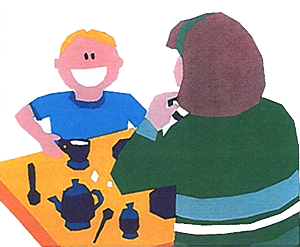Family
Talk to your child’s teacher when possible. Encourage your child to tell you about school and if they are being bullied. Have your child do small chores or ask them to help around the house. This will teach responsibility. Timeouts should be used as quiet time for your child in a neutral area of the house (one minute for each year of age) with no toys or distractions. Make sure not to talk to them while they are in timeout but be sure to explain to them why they were in timeout.
Development
At this age, your child may have trouble controlling his/her anger. Teach them to talk about their feelings when they are upset. Praise your child for good behavior and give them plenty of affection. Your child will want to be more independent so allow them to do things without help. Have your child follow rules at home in preparation for school. Let your child pick books to read for bedtime.
Health
Limit screen time to no more than 1 hour a day. This includes tablet/phone time as well as educational TV shows. No eating in front of the screen (phone, tablet, TV) and no TV in the bedroom. Encourage the entire family to play together outside every day. Your child should be washing their hands often after playing outside, using computers or phones, and after playing with pets. Children should brush their teeth at least twice a day with pea-sized amount of toothpaste. Brush their teeth after them up until they are seven years old. Make sure your child is getting a good night’s rest. They need 10 to 13 hours of sleep. Lack of sleep will make your child fussy and cranky.
Nutrition
Give your child 3 meals with 2-3 healthy snacks a day. Make sure they eat a healthy breakfast every day. For snacks, give your child fruit, vegetables, turkey/cheese roll-up and plain or vanilla yogurt (avoid snacks like yakult or danonino). Give your child milk 2-3 times a day and limit their juice to 4 oz a day and no soda. Teach your child to eat when they are hungry and stop when they feel satisfied.
Safety
Your child should still sit in a booster seat. Teach your child about bus safety and to never cross the street alone. “Stranger danger” is an important lesson for your child. Tell your child that no adult should ask them to keep secrets and no one should touch/see their private parts. Never let your child ride a bicycle without a helmet. Your child should wear sunscreen when playing outside. Teach your child how to swim and always watch them around water. Install smoke alarms in your home.
Poison Control: 1-800-222-1222
After Hours and Weekends
After 4:00 PM and before 8:00 AM
For medical advice when People’s is closed call After Hours Nurse line at 512-478-4939
Download PDF here.



